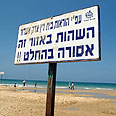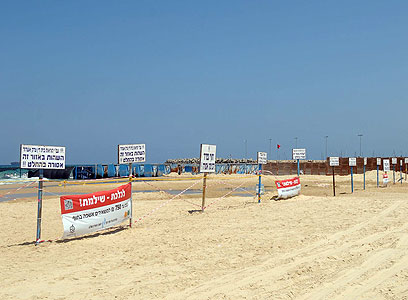
'Absolutely no bathing.' Sign on beach
צילום: אבי רוקח
Ashdod: Beach segregation angers secular bathers
Ashdod residents say municipality closed stretch of beach to the public to shield religious bathers from immodest co-ed beachgoers
A stretch of beach in Ashdod has become a bone of contention between residents of the southern port city in recent weeks after the municipality chose to shut it down, seemingly in order to shield religious bathers from secular ones.
Like most Israeli cities located on the shore of the Mediterranean, Ashdod has a sex segregated beach that caters to religious bathers. But recently a new fence has been installed just 200 meters south of the walled-off area, effectively creating a buffer zone between the restricted beach and the co-ed waterfront frequented by the secular public.
Signs warn beachgoers that the area was closed to the public at the order of the Ashdod Court of Justice.
While the northern boundary of the religious beach remains without such a "safety zone," municipality workers often ask secular bathers to avoid sitting close to the fence.

Closed off zone (Photo: Avi Rokach)
"There isn't a law in the world that could allow for a public beach to be shut down, and we're fighting against this illegal measure," said Elizabeth Kadosh, 26, an Ashdod resident. "This religious coercion bothers me. If they would have expanded the beach because it was overcrowded, it wouldn't have bothered me. But this measure is a provocation."
Liat, another resident, said that secular residents shouldn't be penalized for the religious sector's lifestyle.
"I have no problem with the fact that the religious residents have their own beach," she said. "What bothers me is that they are trying to take over a larger strip of beach only because they cannot control their urges and keep peeking at us."
'Buffer zone helps us stay pious'
The religious bathers, on the other hand, stress that the buffer zone is meant to protect the privacy to which they are entitled.
"The additional separation is meant to make it impossible to recognize who is bathing on the beach," said Osnat Uziel, a religious beachgoer. "As a religious woman I don't want to be seen like that, even though I go into the water with my clothes on.
"Everyone probably thinks that this strip of beach was closed because of narrow-minded haredim, but this is the only way that… honors each person's right to his beliefs," she added.
But Moshe Gershon, who arrived at the segregated beach with his three sons, admitted that the separation was meant to shield religious bathers from sneaking peeks at the immodestly-dressed secular bathers.
"The separation was meant to help us to avoid violating our beliefs and prevent us from looking at the female bathers on the adjacent beach," he said. "You have no idea how beneficial this separation is… Modesty can only enrich married life, and I'm glad that the lifeguard goes beyond his duties and protects the partition.
"My kids' break from school is so short, and this allows them to enjoy the beach in a way that doesn't hurt them. Why is that bad?"
The Ashdod Municipality said in response that it decided to temporarily expand the religious beach by 80 meters on its southern side due to the perilous uneven terrain and strong currents on its north side.










